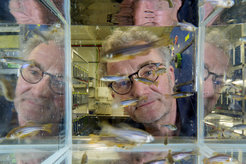Zebrafish: Tiny windows into the wonders of life
These tiny fish, with their transparent bodies and fascinating stripes, are helping scientists unlock the secrets of brain function and fight cancer.
The zebrafish, small striped fish measuring just four to five centimetres, has garnered global scientific acclaim. This recognition stems largely from their unique properties, which were initially highlighted by Nobel Laureate Christiane Nüsslein-Volhard in her groundbreaking work on pattern formation, growth, and cell migration during vertebrate development at the Max Planck Campus in Tübingen. In an interview with SWR, learn more about their incredible contributions to research in Tübingen.

The zebrafish's near-translucency allows scientists to observe their growth and development under a microscope. Coupled with their rapid reproduction and relatively simple brain structure (comprising approximately 100,000 cells compared to the human brain's staggering 100 billion), they offer a valuable model organism for research.
Leveraging these advantages, several research groups on the Max Planck Campus in Tübingen use zebrafish in their investigations.
In an interview with SWR, Jennifer Li and Drew Robson from the Max Planck Institute for Biological Cybernetics in Tübingen describe their work studying zebrafish brains using a high-tech microscope. Their research group observes the brains of young zebrafish as they navigate a specially designed labyrinth, enabling them to observe neural activity within the living animals simultaneously.
Similarly, Uwe Irion from the Max Planck Institute for Biology in Tübingen discusses his zebrafish research with SWR. He emphasises the utility of zebrafish in testing cancer drugs and novel therapies, as they can thrive at 37°C, mirroring human body temperature. This research holds immense promise for developing personalised cancer treatments, a goal that may soon become a reality.
Thanks to this SWR interview with Uwe Irion and Jennifer Li, you'll find out more about zebrafish and the research conducted thanks to them at the Max Planck Institute for Biology Tübingen and Max Planck Institute for Biological Cybernetics: https://www.swr.de/wissen/modellorganismen-zebrafisch-labor-forschung-104.html
